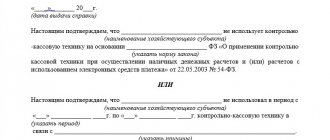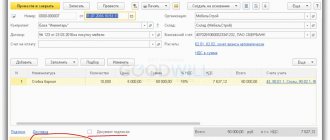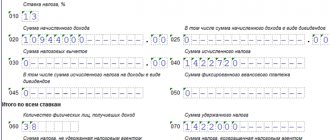What is a waybill
A permit is a document that is issued to the driver by his employer - an individual entrepreneur or a legal entity - at the beginning of each trip or work shift. The document records:
- name of the organization that owns the car;
- FULL NAME. the driver and a note indicating that he has undergone a pre-trip medical examination;
- information about the vehicle, including its maintenance history, mileage and the moment when it left the parking lot and then when it returned.
IMPORTANT!
In 2021, liability for the lack of a waybill for the driver of a car or truck is a fine from 500 to 30,000 rubles!
This document is used to record:
- fuels and lubricants;
- mileage, wear and technical condition of the vehicle;
- the driver's working hours and his physical condition.
Each organization has the right to independently develop forms for its transport registration documents, the main thing is that their content and procedure for filling out comply with the rules established by Order of the Ministry of Transport of Russia dated September 18, 2008 No. 152 (as amended).
Types of truck waybills
The mandatory application form for both cars and trucks is not established by law. Based on Article 9 of the Law on Accounting dated December 6, 2011 No. 402-FZ, the organization develops the “primary” forms independently. According to information from the Ministry of Finance of the Russian Federation No. PZ-102012, the use of unified forms of primary documents starting from 2013 is not mandatory. However, despite this, companies and individual entrepreneurs continue to use them, stating this fact in their accounting policies.
On the other hand, unified forms do not contain mandatory details for filling out the PL, so their use may entail a violation of regulatory requirements.
Thus, the unified forms can only be taken as a basis and supplemented with the necessary details.
Resolution of the State Statistics Committee of the Russian Federation dated November 28, 1997 No. 78 approved two types of unified waybills:
- according to form No. 4-C;
- according to form No. 4-P.
The difference between these forms is that the first, No. 4-S (piecework) is used when paying for piecework work on a truck, and the second, No. 4-P (time-based) is used when paying for work at a time-based rate (simultaneous transportation of goods up to two customers during one driver shift).
Who uses
Individual entrepreneurs and legal entities issue the registration document to their drivers.
In accordance with paragraph 2 of Art. 6 of Federal Law No. 259-FZ of November 8, 2007, it is issued to the driver of a passenger or cargo vehicle, bus, trolleybus or tram if he is transporting passengers, cargo or luggage.
In practice, if during an inspection it is discovered that the vehicle is registered to an individual entrepreneur or a legal entity, the inspecting inspector will require a registration document. Formally, if a driver uses a company vehicle for personal purposes, in agreement with the management, this case does not fall under the list of those when a registration document is required, but it is not always possible to prove personal and not commercial use, and the driver receives a fine. This conflict is not clearly resolved in the law and often leads drivers to court to challenge the punishment imposed on them.
What is the penalty for not having a “ticket”?
If the driver should have a waybill, but does not have one, when stopping, a traffic police officer may issue a fine. Although it is possible to issue a warning under this article.
Important! Errors in the sheet are equivalent to its absence.
What size of the fine does the Code of Administrative Offenses provide for the absence of a DP?
- for drivers – 500 rubles;
- for officials – 20 thousand. rub.;
- for legal entities and individual entrepreneurs – up to 100 thousand. rub.
Collections from individual entrepreneurs
If the entrepreneur is also a driver (some taxi drivers work this way), the fine can actually amount to 100,000 rubles.
Collections from organizations (legal entities)
Sometimes circumstances arise when employees who are not drivers and do not transport anything for commercial purposes are forced to use official vehicles. And even in this case, issuing a fine is legal. This is evidenced by the Supreme Court Decision No. 302-KG14-529 of 2014. The waybill is necessary because the company must ensure the safety of employees driving their vehicle. Otherwise, the organization faces a fine of up to 100 thousand rubles.
Collections from truck drivers
The truck driver is required to have a waybill. If the requirement is not met, a fine will be imposed. Its size will depend on who owns the vehicle – from 500 rubles to 100 thousand.
Collections from car drivers
If the driver is in a car without passengers or cargo, it is not necessary to have a permit. The same applies to the situation when a power of attorney is issued to the driver. The need for a waybill arises when passengers or luggage are transported in a passenger car. This rule also applies to taxis. If there is no voucher, a fine of up to 100 thousand rubles will be imposed. The size depends on the article of the Code of Administrative Offenses, which the inspector will point out.
Types of fines for waybills
The absence of a driver's permit when checked by a traffic police officer is an administrative offense; liability arises both for the driver himself and for the owner of the vehicle - an individual entrepreneur or a legal entity. The fine for not having a waybill is established by the norms of the Code of Administrative Offenses of the Russian Federation.
A traffic police officer who has stopped a vehicle for inspection has the right to demand a registration document when recording a traffic violation or in the event of a traffic accident. The following may check your vouchers:
- labor inspection, which checks the organization's compliance with workers' rights;
- tax inspectorate, checking the correctness of accounting for the organization's expenses on gasoline, during an on-site or desk audit.
| Violation | Amount of fine | Base | A comment |
| Failure to provide a voucher during an inspection by an inspector. | For the driver - 500 rubles. | Article for the absence of a waybill - Part 2 of Art. 12.3 Code of Administrative Offenses of the Russian Federation. | The Code of Administrative Offenses of the Russian Federation does not imply that evacuation is possible for the absence of a waybill - this offense is not included in the list of violations requiring the detention of a vehicle. |
| There is no voucher or it is incorrectly issued, the organization faces a fine for the lack of a medical examination in the voucher. | For a legal entity or individual entrepreneur - 30,000 rubles. | Part 2 art. 12.31.1. | The Code of Administrative Offenses of the Russian Federation does not establish fines for the absence of a waybill for individual entrepreneurs or legal entities - they are responsible for related violations provided for in Art. 12.31.1 Code of Administrative Offenses of the Russian Federation. There are no separate sanctions for individual entrepreneurs; entrepreneurs bear the same responsibility as organizations - this rule is established by the note to Art. 12.31.1 Code of Administrative Offenses of the Russian Federation. A sanction in the form of being sent to a parking lot for the absence of a waybill is not provided for any of these offenses. |
| The document does not contain a mark on the passage of pre-trip maintenance, or if there is none at all. | For a legal entity or individual entrepreneur - 30,000 rubles. | Part 3 art. 12.31.1 Code of Administrative Offenses of the Russian Federation. | |
| Carrying out transportation of passengers and luggage, cargo by road and urban ground electric transport in violation of the requirements for pre-trip and post-trip medical examinations of vehicle drivers and pre-trip monitoring of the technical condition of vehicles. | For an official - 5,000 rubles. | Clause 2, 3 art. 12.31.1 Code of Administrative Offenses of the Russian Federation. |
General information
Regular transportation of passengers, as well as transportation of goods by means of vehicles, can only occur on the basis of the appropriate document. Its role is played by a waybill. It reflects the main information about the operation of the vehicle.
Availability requirements
The sheet must be present when the vehicle is used for commercial purposes by legal entities or entrepreneurs. This obligation applies to many types of vehicles, so it is worth considering them in more detail.
Vehicles that require a waybill include:
- Vehicles intended for scheduled or irregular transportation;
- Cars for cargo transportation;
- Tractors and similar types of transport that are operated on a commercial basis.
In general, a fine for driving without a waybill in 2021 only threatens certain types of transport. This must be taken into account by organizations and enterprises whose vehicle fleet includes trucks or other listed vehicles.
General content
The presented document contains information on how to use the machine. The need for a waybill is often explained by the fact that with its help it is easier for regulatory authorities to check entrepreneurs. In particular, the following information is indicated:
- Business name;
- Driver information;
- Vehicle characteristics;
- Information about travel routes.
It is important to know! The presented document is also valuable for maintaining financial statements. It is used to determine the frequency of vehicle operation, driver work time, mileage and fuel consumption of the vehicle.
One of the reasons why a legal entity faces a fine for the lack of a waybill in 2021 is precisely the loss of valuable information that can be used when checking a company.
Validity
This indicator depends on the purpose and duration of the trip. In many cases, a one-day sheet is chosen for registration. This method is optimal for short-term flights. If the vehicle will be used for longer, a document valid for 1 month will be issued. At the same time, if several persons are allowed to drive a particular vehicle, then the permit is issued for each individual.
Fines for cars
The Code of Administrative Offenses of the Russian Federation does not establish a separate fine for the absence of a waybill for a passenger car; the rules are the same for all types of transport. As a rule, with passenger cars there are disputes regarding the need for a voucher: if the car is used for personal purposes, even if it is official, it is not needed. But it is often not possible to prove this to the inspector, and the dispute is taken to court.
Taxi employees most often work in passenger cars; the fine for not having a taxi waybill is the same - 500 rubles; taxis are also required to issue vouchers. Any form is possible, taking into account the latest requirements and recommendations of the Ministry of Transport of the Russian Federation.
Nature of punishment
The question of what the fine is for not having a waybill is relevant for all owners of commercial vehicles. In this case, it all depends on which regulatory body detected the offense.
If the vehicle is stopped by traffic police officers, then for driving without a permit you will be fined 500 rubles. Moreover, this amount is not affected by the dimensions and intended purpose of the machine. An organization can also be audited by the tax service. If the violation was repeated many times - for two or more periods, then the fine for a waybill reaches 30,000 rubles.
Attention! Some enterprises deliberately do not use waybills. This is done in order to reduce the tax base. If such a violation is detected, the amount will be at least 40,000 rubles. At the same time, until payment is made, the vehicle may be confiscated and transported to an impound lot.
Large material sanctions are paid directly by the individual entrepreneur. But a small fine without a waybill may be required to be paid personally by the driver. The possibility of such punishment indicates that any enterprises and organizations should comply with established standards and not try to reduce costs by illegal means.
Vehicles operated for commercial purposes have a number of special requirements. These include the presence of a waybill - a document reflecting the specifics of the use of a particular vehicle. The absence of such a certificate is a serious violation, for which a fine is imposed.
How long to store vouchers
Order of the Ministry of Transport of Russia dated September 18, 2008 No. 152 in paragraph 18 establishes that the storage period for waybills is at least five years, that is, the organization has the right to store them longer.
Order of the Ministry of Culture of Russia dated August 25, 2010 No. 558 in paragraph 842 specifies the rules for determining the shelf life: five years, if checks and audits were carried out during this time. If vouchers are the only documentary evidence of difficult or harmful working conditions for employees of an organization, they must be stored for 75 years.







